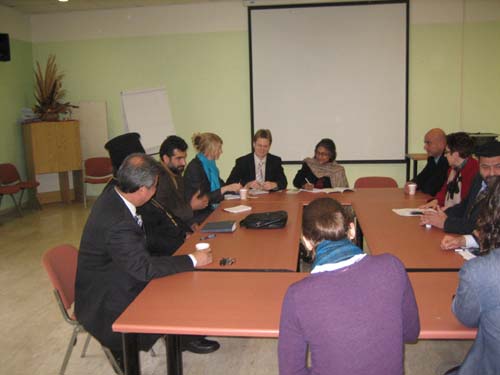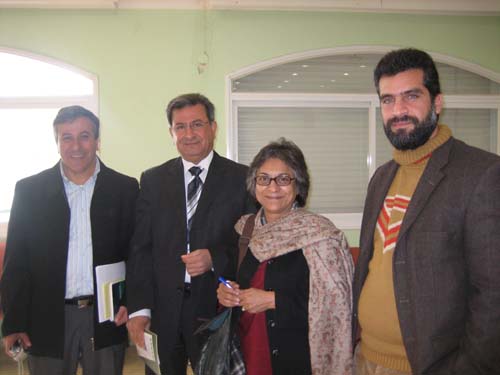
On 23 January 2008, Ms. Asma Jahangir, the UN Special Rapporteur on Freedom of Religion or Belief, visited Adalah’s offices for a briefing on Israel’s discriminatory laws and practices against Arab religious communities in Israel. Qadi Ahmad Natour, Head of the Shari’a Court of Appeals in Israel; Atallah Hanna, Archbishop of the Greek Orthodox Patriarchate in Jerusalem; Mr. Farid Hajj Yahia, Chairman of the Al-Aqsa Organization; and Adalah staff presented main issues of concern to the Arab Muslim and Christian religious communities in Israel.
Qadi Natour discussed the issue of Arab Muslim religious sites and Waqf properties that have been destroyed since 1948 or expropriated by the state under the Absentee Property Law-1950, as well as the state’s encroachment on the autonomy of the Islamic Shari’a courts in a range of personal status issues. Qadi Natour highlighted discrimination in budget allocations to Arab religious communities in Israel, as they receive only 2% of the Ministry of Religious Affairs’ budget. Archbishop Hanna emphasized that the Christian community in Israel and the Occupied Palestinian Territory (OPT) is in numerical decline as a result of the discrimination they face. The Archbishop also gave several examples of how Israel interferes with and obstructs Church affairs, including the appointment of religious leaders, travel by Church leaders to and from Israel and the operation of religious seminaries. Mr. Yahia discussed the destruction and desecration of mosques and Islamic Waqf endowments in Israel and the lack of state protection for non-Jewish holy sites. He stressed that hundreds of mosques were destroyed and in some cases converted to synagogues and for other uses, including bars and restaurants.
Adalah’s General Director Attorney Hassan Jabareen asserted that Israel perceives its Jewish character to be threatened by the presence of the indigenous Arab religious communities. He discussed cases filed by Adalah to the Israeli Supreme Court including demands to re-open the Big Mosque in Beer el-Sabe to prayer and to declare Arab religious sites as holy sites under the law as currently only Jewish holy sites have been so designated and thus receive protection and state funds.
Ms. Jahangir’s visit to Israel and the OPT is her first fact-finding mission to the region as UN Special Rapporteur. The mandate of the Special Rapporteur includes: examining incidents and governmental actions in all parts of the world which are inconsistent with the provisions of the Declaration on the Elimination of All Forms of Intolerance and of Discrimination Based on Religion or Belief; identifying gender-specific abuses in the context of religious freedom; and recommending remedial measures to respond to instances of intolerance or discrimination based on religion or belief.. Ms. Jahangir conducts fact-finding country visits; sends urgent appeals to and keeps in contact with states regarding violations of the freedom of religion and belief; and reports to the UN Human Rights Council and General Assembly on her activities, findings, and recommendations.
Ms. Jahangir has served as UN Special Rapporteur on Freedom of Religion or Belief since 2004, and previously as the UN Special Rapporteur on Extrajudicial, Summary or Arbitrary Executions. She also served as the Chair of the Human Rights Commission of Pakistan, of which she was a founding member, and an advocate at the Supreme Court of Pakistan (1992-2004). She started the first all-women law firm in Pakistan in 1981.


